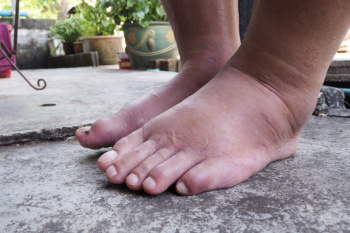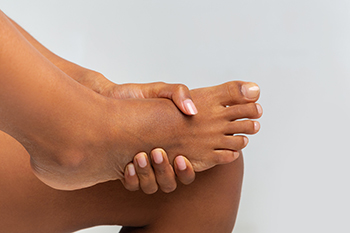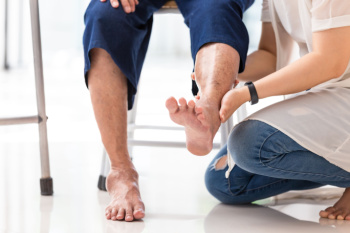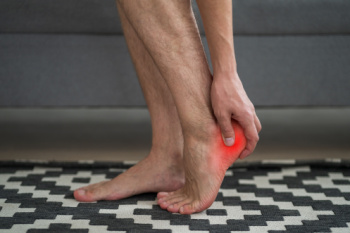Baytown, TX (281) 837-8371
December 2024
Why Do I Have Swollen Feet?

Swollen feet can be an uncomfortable issue, often caused by injuries or edema. Edema refers to the accumulation of fluid in the tissues, leading to swelling. People who are more likely to experience swollen feet include those with recent injuries, such as sprains or fractures, which can cause localized swelling. Edema can also result from conditions like pregnancy, heart disease, kidney disease, or prolonged standing or sitting. The causes of swollen feet vary, but other contributing factors include poor circulation, high salt intake, or side effects from medications. In some cases, swelling may be a sign of a more serious underlying issue, such as blood clots, infections, or vascular problems. While mild swelling may improve with rest, elevating the feet, or wearing compression socks, persistent or severe foot or ankle swelling should be evaluated by a podiatrist. This type of doctor can help diagnose the cause of the swelling and recommend appropriate treatments. If you are experiencing swollen feet, it is suggested that you schedule an appointment with a podiatrist.
Swollen feet can be a sign of an underlying condition. If you have any concerns, contact Abeer M. Foteh, DPM of Greater Houston Foot Centers. Our doctor can provide the care you need to keep you pain-free and on your feet.
Swollen feet are a common ailment among pregnant women and people who stand or sit for extended periods. Aging may increase the possibility of swollen feet and patients who are obese often notice when their feet are swelling too. There may be medical reasons why swollen feet occur:
- Phlebitis - A condition that causes the veins to become inflamed and can also cause leg pain.
- Liver disease - This may lead to low blood levels of albumin which is a protein. This can cause fluid in the blood to pass into the tissues and several areas of the body can become swollen.
- Heart failure - When the heart doesn’t pump properly the blood that is normally pumped back to the heart can pool in the veins of the legs causing swollen feet.
- Kidney disease - One of the main functions of the kidneys is releasing excess fluid in the body. This type of condition can make it difficult for the kidneys to function properly, and as a result the feet may become swollen.
- Deep-vein thrombosis (DVT)- This is a serious condition where blood clots form in the veins of the legs. They can block the return of blood from the legs to the heart which may cause the feet to swell. It is important to be treated by a podiatrist if this condition is present.
Swollen feet can also be caused by bone and tendon conditions, including fractures, arthritis, and tendinitis. Additionally, there may be skin and toenail conditions and an infection may cause the feet to swell. Patients who take medicine to treat high blood pressure may be prone to getting swollen feet.
Many patients elevate their feet to help relieve the swelling and this is generally a temporary remedy. When a podiatrist is consulted the reason behind the swelling can be uncovered and subsequently treated.
If you have any questions please feel free to contact our office located in Baytown, TX . We offer the newest diagnostic tools and technology to treat your foot and ankle needs.
Mueller-Weisse Disease: A Congenital Foot Condition

Mueller-Weisse disease is a rare congenital foot condition that affects the bones and structures in the arch of the foot. It occurs when the arch fails to develop properly during early childhood, leading to an abnormal shape of the foot. The exact cause of Mueller-Weisse disease is not fully understood, but it is believed to involve genetic factors that impact the formation of the tarsal bones. Symptoms of the condition include a flat or collapsed arch, pain in the midfoot or heel, and difficulty walking or standing for long periods. As the condition progresses, the foot may become more rigid and less flexible. Early diagnosis and treatment are essential for managing symptoms, which may include custom orthotics, or in severe cases, surgery to improve function and comfort. If your child has been born with this condition, it is suggested that you include a podiatrist on your healthcare team who can help you to manage Mueller-Weisse disease.
Some foot conditions may require additional professional care. If you have any concerns, contact Abeer M. Foteh, DPM of Greater Houston Foot Centers. Our doctor can provide the care you need to keep you pain-free and on your feet.
Rare Foot Conditions
The majority of foot conditions are common and can be treated by a podiatrist. Standard diagnostic procedures are generally used to identify specific conditions and treatment can be rendered. A podiatrist also treats rare foot conditions which can be difficult to diagnose and may need extra attention and care.
There are many rare foot conditions that can affect children. Some of these can include:
- Freiberg’s disease
- Kohler’s disease
- Maffucci syndrome
Freiberg’s disease - This can be seen as a deterioration and flattening of a metatarsal bone that exists in the ball of the foot. It typically affects pre-teen and teenage girls, but can affect anyone at any age. Symptoms that can accompany this can be swelling, stiffness, and the patient may limp.
Kohler’s disease - This often targets the bone in the arch of the foot and affects younger boys. It can lead to an interruption of the blood supply which ultimately can lead to bone deterioration. The patient may limp or experience tenderness, swelling, and redness.
Maffucci syndrome - This affects the long bones in a child’s foot leading to the development of abnormal bone lesions. They are benign growths and typically develop in early childhood and the bones may be susceptible to breaking.
A podiatrist can properly diagnose and treat all types of rare foot conditions. If your child is affected by any of these symptoms or conditions, please don’t hesitate to call our office so the correct treatment method can begin.
If you have any questions please feel free to contact our office located in Baytown, TX . We offer the newest diagnostic tools and technology to treat your foot and ankle needs.
Choosing the Right Long Distance Running Shoes

Choosing the right long distance running shoes is essential for comfort and injury prevention. Start by considering your arch type, which can be high, medium, or low. A proper shoe should support your specific arch to promote natural foot alignment. Foot pronation, or how your foot rolls inward while running, is another factor to consider. Overpronation or underpronation may require shoes with extra support or cushioning to correct the motion. Cushioning support is also important for long runs, as it absorbs shock and reduces strain on your joints. Pay attention to shoe size and fit to avoid discomfort. Your shoes should be snug but not too tight, with enough room in the toe box to prevent rubbing. Choosing shoes that suit your individual needs ensures a comfortable and injury-free running experience. If you enjoy this type of running and have endured a foot injury from wearing the wrong types of shoes, it is suggested that you contact a podiatrist who can offer you treatment solutions, in addition to guiding you on what type of shoes to buy.
If you are a runner, wearing the right running shoe is essential. For more information, contact Abeer M. Foteh, DPM from Greater Houston Foot Centers. Our doctor can provide the care you need to keep you pain-free and on your feet.
Choosing the Right Running Shoe for Your Foot Type
To increase performance and avoid the risk of injury, it is important to choose the right running shoe based on your foot type. The general design of running shoes revolves around pronation, which is how the ankle rolls from outside to inside when the foot strikes the ground.
- Neutral runners are able to choose from a wide variety of shoes, including minimalist shoes or even going barefoot.
- Runners who overpronate, or experience an over-abundance of ankle rolling, should choose shoes that provide extra motion control and stability.
- Runners who underpronate, or supinate, have feet that have high arches and lack flexibility, preventing shock absorption. They require shoes with more flexibility and cushion.
If you have any questions please feel free to contact our office located in Baytown, TX . We offer the newest diagnostic and treatment technologies for all your foot and ankle needs.
Identifying Charcot-Marie-Tooth Disease

Charcot-Marie-Tooth disease, or CMT, is a genetic condition that primarily impacts the peripheral nerves, which connect the brain and spinal cord to the rest of the body. This condition often begins to affect the feet and lower legs first, with symptoms typically starting between the ages of 5 and 15. People with Charcot-Marie-Tooth disease may experience high-arched feet, flat feet, hammertoes, muscle weakness in the lower legs, foot drop, and a distinctive high-stepping gait to avoid tripping. Over time, these issues can lead to muscle wasting in the legs, which creates challenges with walking and balance. A podiatrist plays a key role in managing the symptoms of this incurable condition by providing specialized care for foot deformities and gait issues. This may include custom orthotics to support the feet, recommendations for proper footwear, or bracing to improve stability and mobility. Such interventions can enhance a person’s quality of life and reduce discomfort associated with CMT. If you believe you have symptoms of Charcot-Marie-Tooth disease, it is suggested that you schedule an appointment with a podiatrist to help manage this condition.
Neuropathy
Neuropathy can be a potentially serious condition, especially if it is left undiagnosed. If you have any concerns that you may be experiencing nerve loss in your feet, consult with Abeer M. Foteh, DPM from Greater Houston Foot Centers. Our doctor will assess your condition and provide you with quality foot and ankle treatment for neuropathy.
What Is Neuropathy?
Neuropathy is a condition that leads to damage to the nerves in the body. Peripheral neuropathy, or neuropathy that affects your peripheral nervous system, usually occurs in the feet. Neuropathy can be triggered by a number of different causes. Such causes include diabetes, infections, cancers, disorders, and toxic substances.
Symptoms of Neuropathy Include:
- Numbness
- Sensation loss
- Prickling and tingling sensations
- Throbbing, freezing, burning pains
- Muscle weakness
Those with diabetes are at serious risk due to being unable to feel an ulcer on their feet. Diabetics usually also suffer from poor blood circulation. This can lead to the wound not healing, infections occurring, and the limb may have to be amputated.
Treatment
To treat neuropathy in the foot, podiatrists will first diagnose the cause of the neuropathy. Figuring out the underlying cause of the neuropathy will allow the podiatrist to prescribe the best treatment, whether it be caused by diabetes, toxic substance exposure, infection, etc. If the nerve has not died, then it’s possible that sensation may be able to return to the foot.
Pain medication may be issued for pain. Electrical nerve stimulation can be used to stimulate nerves. If the neuropathy is caused from pressure on the nerves, then surgery may be necessary.
If you have any questions, please feel free to contact our office located in Baytown, TX . We offer the newest diagnostic and treatment technologies for all your foot care needs.
Why You Should Not Ignore Foot Pain

Ignoring foot pain can have serious consequences for your balance, mobility, and overall foot health. Persistent pain often signals an underlying issue that, left untreated, may worsen over time. Conditions like stress fractures, heel pain, and psoriatic arthritis are common sources of foot pain and can severely impair foot function if not addressed. Even minor discomfort can cause changes in your gait, leading to strain in other areas of the body, like the knees, hips, and back. Determining the cause of foot pain is essential for effective treatment, as each condition requires a different approach. Addressing foot pain early can help you maintain balance, improve mobility, and reduce the risk of chronic issues, keeping you active and pain-free. If you suffer from foot pain, it is suggested that you schedule an appointment with a podiatrist for a proper diagnosis and treatment.
Foot Pain
Foot pain can be extremely painful and debilitating. If you have a foot pain, consult with Abeer M. Foteh, DPM from Greater Houston Foot Centers. Our doctor will assess your condition and provide you with quality foot and ankle treatment.
Causes
Foot pain is a very broad condition that could be caused by one or more ailments. The most common include:
- Bunions
- Hammertoes
- Plantar Fasciitis
- Bone Spurs
- Corns
- Tarsal Tunnel Syndrome
- Ingrown Toenails
- Arthritis (such as Gout, Rheumatoid, and Osteoarthritis)
- Flat Feet
- Injury (from stress fractures, broken toe, foot, ankle, Achilles tendon ruptures, and sprains)
- And more
Diagnosis
To figure out the cause of foot pain, podiatrists utilize several different methods. This can range from simple visual inspections and sensation tests to X-rays and MRI scans. Prior medical history, family medical history, and any recent physical traumatic events will all be taken into consideration for a proper diagnosis.
Treatment
Treatment depends upon the cause of the foot pain. Whether it is resting, staying off the foot, or having surgery; podiatrists have a number of treatment options available for foot pain.
If you have any questions, please feel free to contact our office located in Baytown, TX . We offer the newest diagnostic and treatment technologies for all your foot care needs.








